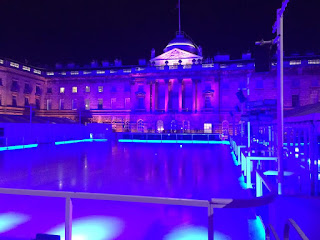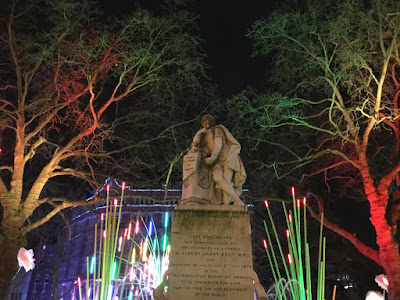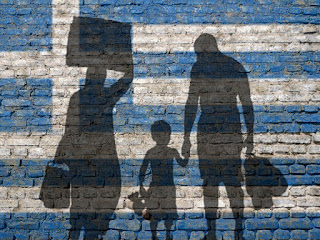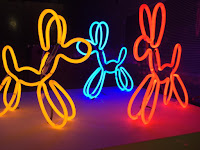Wild, Hybrid and Cultivated - Blog on the bridge between botany, languages and marketing communications T:+44 (0)20 8581 9369; Email: karen.transcreation@gmail.com; Twitter: @BotanyKaren by Karen Andrews
Sunday, 24 January 2016
Ordinary Europeans for Nobel Peace Prize?
Ordinary Europeans have shown extraordinary courage and selflessness towards the many refugees who have arrived in their lands. When others turned them away with barbed wire and troops, the Greeks and Germans welcomed them with true humanity.
Greece is not a rich country. We are all aware that the Greek people have suffered the most in the economic crisis under Austerity. Still they remind us of what is important in life: our common humanity.
A nomination is currently doing the rounds for the Greek islanders to be nominated for a Nobel Peace prize. They helped those in need and mortal danger without any expectation of reward. A smile was enough.
The German people also extended an extraordinary hand of welcome. Integration will not be easy. There are already and will be many problems. A Nobel Peace Prize will be a source of inspiration. When the difficulties ahead cause some to doubt, it will continue to encourage.
The Greeks and Germans do not have the easiest relationship in Europe. Shouldn't both peoples be recognised for their part in handling the refugee crisis?
The nomination is in our hands. Yes, we could nominate a high profile figure. Doesn't it give a better message to the world when ordinary people are nominated? Together the Greek and German peoples showed us the more compassionate Europe and World that we would all like to live in.
For such leadership, without hope of recognition, the Greek and German peoples should be recognised together.
Link to the Greek Islanders nomination:
Avaaz
Related stories:
Common dreams on Greece
Guardian on Greece
Germany welcomes refugees
German bilingual translation efforts to make families feel welcome and settle more easily
Labels:
Austerity,
civilisation,
crisis,
danger,
Europe,
German,
Greece,
Greek islanders,
humanity,
leadership,
Nobel Peace Prize,
people,
recognition
Dancing on ice
 |
| Somerset House's ice rink in a purple/blue light |
It is much easier it is to explain or bring an idea life by using images from another field. Innovation on ice leads to reflections on translation innovations.
I grew up watching British ice dancers Jayne Torvill and Christopher Dean. No Brit could forget their artistic performance or their perfect scores at the Sarajevo Winter Olympics. The British gold medallists were highly innovative in their day.
Judged against my past experiences, the young Canadian ice skaters of Le Patin Libre caught me by surprise. There were no lifts. Few jumps. No fancy costumes. Few artistic flourishes.
The four skaters stayed largely upright as in their Vertical title. They looked like four pillars dancing separately in formation.
The music and light seemed stark. You could hear the sound of their blades cutting into the ice.It formed a deliberate and integral part of their performance.
Some of the movements were decidedly angular and unorthodox. They even dug their exposed blades into the ice at diagonals.
The ice dance rulebook had been thrown away. What would the traditional Olympic ice dance judges make of this?
And yet... my eyes focused on the movement of the skates. I traced their weaving and circular patterns on the ice. I marvelled at the technical mastery.
No star
There was no star. All four skated as a group. There was the occasional solo. It was not an opportunity to show off. Not a cameo. Each solo remained part of, and in keeping with, the group performance.
Even the female member of the group was not there to be pretty on the eye. She was dressed in the same casual, street dance style as the men. She had earned her place in the team as a technical and athletic equal.
Technical mastery
I watched the performance as transfixed as I had Torvill and Dean in the past. It was different. Innovative. It seemed raw at first. On closer inspection, it was masterful. Or, as one member of the the audience remarked: awesome.
Somerset House trailer for Le Patin Libre:
Translation innovation
When something new bursts onto the scene, we naturally tend to judge it by past experiences, rulebooks and standards. Technology is disrupting the translation industry in a similar way. Tomorrow's translators can expect to work together as a group on large projects. The edges may look raw at first sight. On closer inspection and with greater familiarity, we recognise a new form of professional mastery.
Labels:
group,
ice dance,
innovation,
innovative,
mastery,
professional,
rulebook,
Somerset House,
technical,
technology,
translation
Wednesday, 20 January 2016
French inspire Lumière London
London's
first light festival fascinated both tourists and Londoners alike. The French-inspired Lumière London had everyone marvelling at light displays across the city. Even Sunday's early morning snow and a cold winter's
night couldn't keep them off the streets.
I
started my walk between light displays at Oxford Circus. It was great to be
able to walk around Central London unimpeded by traffic. Sometimes progress was
slow due to the sheer numbers out on the street - despite having all the road and pavements to walk on.
Normally
if you lay down on your back in the middle of Oxford Circus, you can expect
to be flattened by one or more double decker buses. Some spectators
braved the cold road surface to get right underneath 1.8 London by Janet
Echelman. The changing colours were glorious from any angle.
 |
| Light display hanging over Oxford Circus |
Heading
down Regent Street, I found my favourite musical light display, Keyframes. I loved the
moving light figures on the front of Liberty House. This display was originally
created by Groupe LAPS for the famous Fête des Lumières in Lyon, France.
Another Lyon creation appeared further down Regent Street and in Piccadilly. I found it fascinating to watch the movements of Les Luminéoles. The fish floated and swooped above our heads, gradually changing colour. It was spectacular sight against the night sky in a very familiar street.
Further on down, there was another surprise... an enormous, noisy elephant. You could even see Catherine Garret's Elephantastic from the rear in Piccadilly. Eros and the lights in Piccadilly Circus aren't used to being upstaged by an elephant.
I struggled to make out the pictures on the more usual type of son et lumière in Piccadilly. When I reached St James Square, my smartphone went on strike. It refused point blank to take any more photos in front of Chatham House. It would not be coaxed back into action.
 |
| Sea of plastic in Trafalgar Square fountain |
By Trafalgar Square, I realised that I could use my iPad camera instead. There were plastic bottles floating in the fountains. I preferred my native city's illustration of the perils of plastic in our oceans. I saw the Bristol Whales lit up at night last year. By 2050, the seas will contain more plastic than fish.
 |
| Bristol Whales at night |
 |
| Highlighting plastic in our oceans |
The Neon Dogs on The Strand were so popular that it took quite a while to get to the front. The brightly-lit dogs even had a few neon bones.
A longer walk took me to Westminster. It was amazing to see the familiar façade of Westminster Abbey displayed so differently. The lights picked out all the statues really well.
 |
| Spectacularly lit Westminster Abbey |
Next stop was Leicester Square. Here I found Shakespeare surrounded by a garden of light. 2016 marks the 400th Anniversary of his death.
The cinemas in front and to his left displayed Star Wars and The Hateful Eight. I wondered what he would have thought of such modern entertainments.
 |
| Shakespeare's statue in the middle of Leicester Square, London |
The cinemas in front and to his left displayed Star Wars and The Hateful Eight. I wondered what he would have thought of such modern entertainments.
 |
| Shakespeare's view of Star Wars in Leicester Square |
My last stop was in front a brightly-lit ballgown. As one bystander commented, it was a bit see-through to actually be worn.
 |
| Brightly lit ballgown with changing colours |
It was well short of midnight. After such a fairytale night, this Cinderella's feet were aching. So she headed home. By tube, not pumpkin.
Labels:
Bristol,
Bristol Whales,
Fête des Lumières,
French,
light,
London,
Lumière,
Lyon,
plastic in oceans,
Shakespeare,
Star Wars
Tuesday, 12 January 2016
Translators are like glue
 |
| Applying the glue behind the visual c. Patryk Kosmider |
Professional translators are like glue... invisible glue.
The aim is to make the join between two cultures as seamless as possible.
It is easy to underestimate the value of a wordsmith's contribution to a marketing campaign. You don't see all the deliberations over the right term, tone or phrasing. Yet, without a translator's considered input, even the most brilliantly creative visuals can fall flat... or worse.
A pharmaceutical crisis
The importance of the glue reminds me of my first job at the UK sales agency of French glass manufacturers' Saint-Gobain Desjonquères. I worked for the pharmaceutical bottle division.
One day, a buyer at one of our major pharmaceutical customers called urgently. Labels would not stick to our competitors' bottles. They had changed the coating specification.
It was a nightmarish situation for our customer. The production line was down and wasting money. Product was ready, but without viable containers. Orders were stacking up.
I arranged for the urgent delivery of all our existing factory stock. I also booked urgent new production runs with my French colleagues.
I don't remember the exact figures now. I do remember dispatching millions of extra bottles to a very grateful customer that year.
The crisis came about because of poor bonding between the coating, glue and label.
Tales of woe
The internet is littered with tales of woe because someone has cut corners with translation. Some brand-damaging stories are still shared decades later (as my old story above). Social media spreads these tales faster than ever before.
Choose the best
Many translators love to share these stories as examples of what can happen without their professional services. Personally, I prefer to try and demonstrate the positive. However, it isn't easy to see the glue when the bond is good. It is easy to think an alternative, cheaper solution might work ... until a crisis strikes.
Don't come unstuck. Stick with a professional translator.
Labels:
brand,
creative,
crisis,
cultures,
marketing,
pharmaceutical,
professional translator,
social media,
visual
Saturday, 9 January 2016
Ice and the Sky Review
The cinema was as
desolate as the Antarctic wastes in the film. Apparently, London’s expat French
community had already headed home for Christmas. I had come to see the Luc
Jacquet’s stunning Ice and the Sky at the
French Institute’s Ciné Lumière. The quiet cinema only served to heighten my
appreciation of the often lonely figure of Claude Lorius on screen.
COP21 release
This film was
released to coincide with COP21, the 2015 United Nations Conference on Climate
Change in Paris. The French glaciologist, Claude Lorius spent over 10 years of
his life in extreme conditions. He went on 22 polar expeditions between 1957
and 1985.
 |
| The film's French name is La Glace et le Ciel |
Lorius at all ages
Ice and Sky tells the story of his life and
groundbreaking climate research. It combines old film footage with beautiful
shots of Antarctica. We see Claude Lorius as an enthusiastic young adventurer.
We see teams of scientists drilling into the ice and carefully packing the ice
samples for later analysis. We see staged shots of the reflective old man, now
aged 82/3.
Eureka
Evidence
So it proved. There was evidence of the atomic bombs dropped on Hiroshima
and Nagasaki. Evidence of man’s adverse effect on the planet could even be found
in Antarctica’s virgin territory. He went on to sound the alarm on global
warming and expose Man’s devastating impact on the world’s climate.
Painstaking accuracy
We hear of the scientist’s concern to record his findings accurately even in the bitterest
cold. Removing your gloves to write is a painful experience in Antarctica.
Bitter pill
The old man on
screen seemed sad and forlorn. His life’s work has been climatic in more ways
than one. He has won prestigious awards for his research. And yet, the call for
climate action has been hard. Awards become a bitter pill, if your research is
not taken seriously.
Lost voice
In the film, he
has no voice. His words are narrated or captured in old footage. A voice taken
away as his findings were denied for so many years.
Critics
Film critics have
slated Jacquet’s shot of Lorius up to his knees in water as manipulative. People
only really understand research implications when they are presented visually.
I’m sure those who had to wade through flood waters in Britain this Christmas
get the picture.
Retrospective
At the end of
2014, I wrote my ambitious hopes for the world in Climate Change: seeking an impossible solution. I also wrote about the Paris launch in COP21 World's Last Chance. My impression is
that the UN climate talks delivered an agreement that was better than anticipated at this time
last year.
Beauty and thought
Ice and Sky is a thought-provoking film. It has certainly provoked my thinking. Its cinematography was perhaps too beautifully
French for its serious global message.
Epilogue?
The film deserves an epilogue. We should hear from Claude Lorius
on camera, and in his own voice, how he feels about his life’s work following COP21
– and hopefully see him smile.
Wednesday, 6 January 2016
New Year Fireworks in London
 |
| New Year's Eve fireworks at the London Eye |
Here
are links to a YouTube or Vimeo video that I made of the New Year’s Eve fireworks in London. My elder son and I were lucky to be in the second row slightly to the
left of the London Eye on the crowded Thames Embankment. We stood directly opposite the well-lit Shell
Building.
UNICEF
London’s
New Year’s Eve event raised awareness of Unicef. It helps children in danger around
the world. The proceeds will help the millions of displaced Syrian children who
have been in our minds for much of 2015.
 |
| UNICEF: Help Keep Children Safe |
Queues
We
Brits have a reputation for liking queues... Even we began to question this
when we couldn’t find the end of the queue for the Trafalgar Square entrance.
At first, we thought it might stretch all the way down The Mall as far as
Buckingham Palace. That proved not to be the case. Not quite that far anyway.
Security
Security
was high. Fireworks in Paris and Brussels were cancelled. They went ahead in
London. We had to go through several staged bag checks and scans before getting
in. The police were present in high numbers – on foot, on horseback and
watching from helicopters above. They were good-humoured and professional.
 |
| Light display on London Eye |
Building
tension
It
was a long wait for midnight. Luckily the rain held off and the music was
great. There was also a great light show on the London Eye itself. The tension
built.
I
hope you enjoy my video of the main part of the evening.
Happy New Year!
Bonne année
Gutes Neues Jahr
¡Feliz año nuevo!
Gelukkig Nieuwjaar
Subscribe to:
Comments (Atom)









